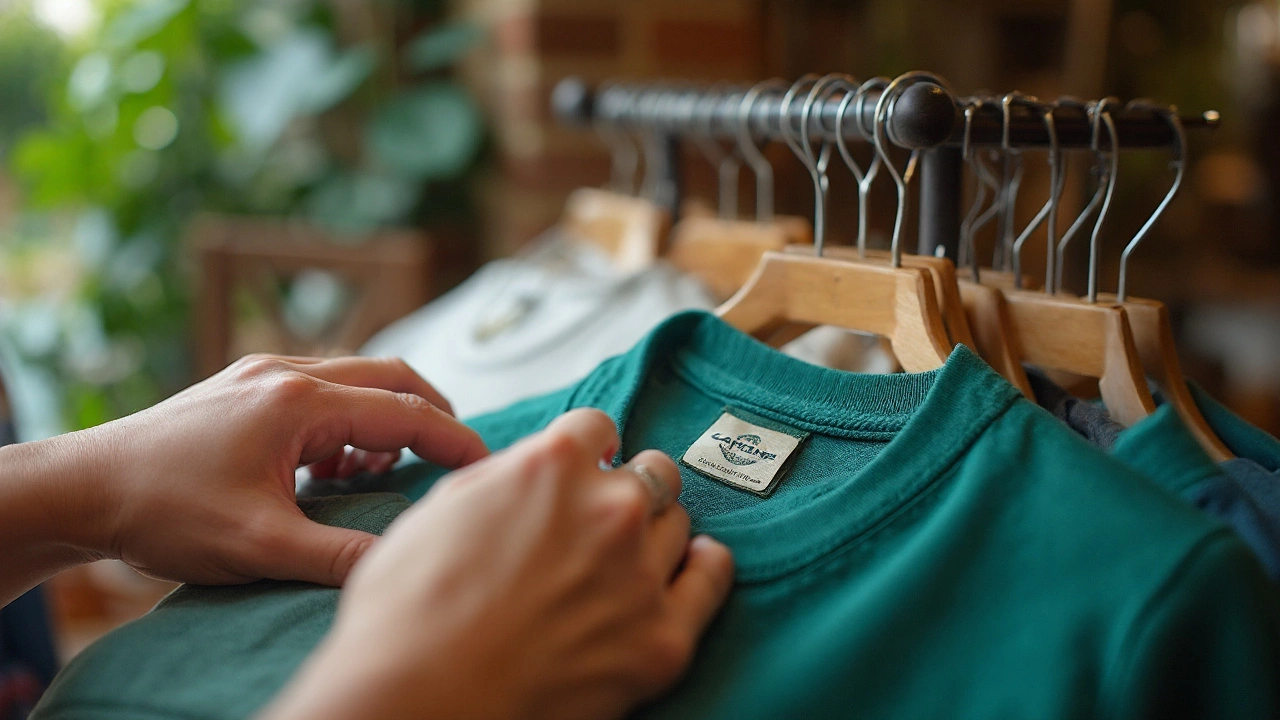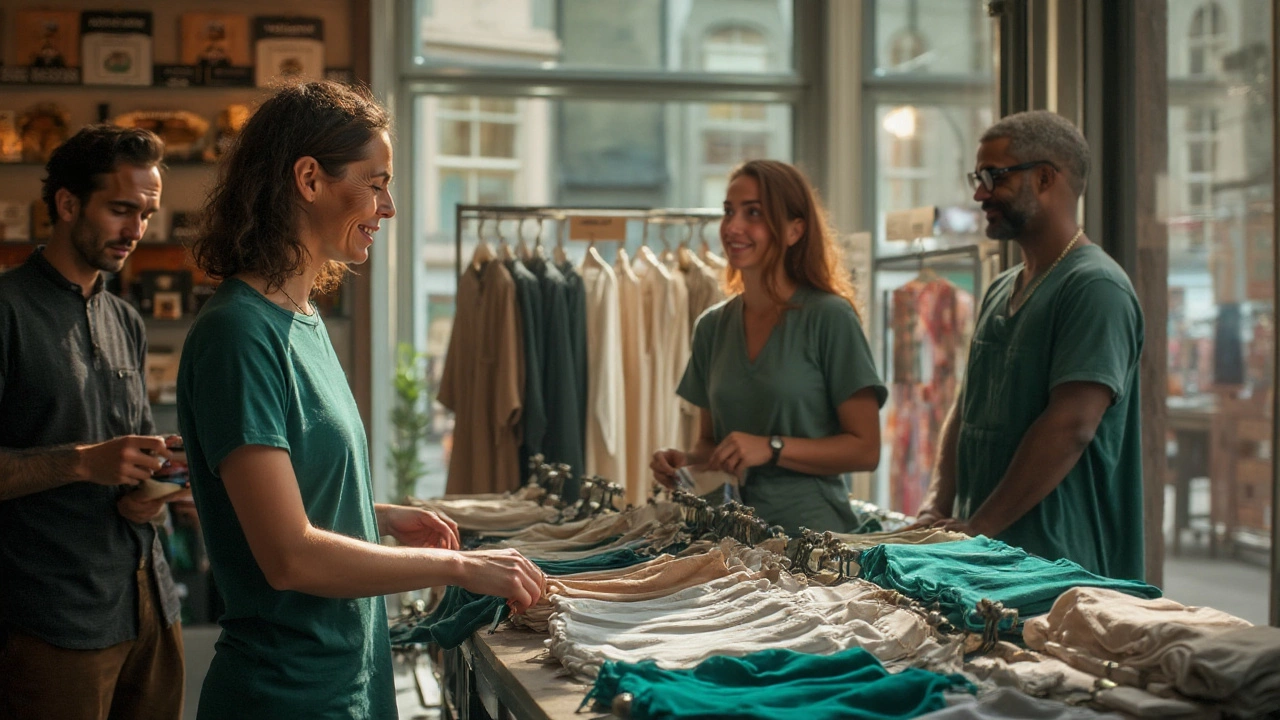It rains sideways in Galway and droughts are rare in Dublin, so it’s no surprise Irish folks care so much about a T-shirt’s quality. Just ask anyone who’s dashed through a sudden shower during a festival in Phoenix Park or spent all day out on the Wild Atlantic Way—the right tee either makes your day or leaves you awkwardly damp and annoyed. In the Irish market, choosing the highest quality T-shirt is a mix of knowing your fabrics, understanding local styles, and figuring out where to find genuine value.
What Makes a T-Shirt High Quality in the Irish Climate?
Let’s get real—Ireland’s weather isn’t gentle on your clothes. Drizzle, random winds, warm days followed by icy evenings: your T-shirt needs to handle this circus. The fabric is king here. Cotton isn’t “just cotton” anymore—you’ll want to hunt for organic or combed cotton that feels cool and resists bobbles (that’s pilling, but Irish folks prefer the simpler word). Egyptian or Pima cotton stands out in the Irish market for its smooth finish and resistance to wear, but you’ll also see some top-end Irish brands like GROWN Clothing using pure, sustainable Irish linen blends. Linen is deadly for breathability when you’re walking Henry Street or sweating out a trad session in Cork.
Ireland’s sea breeze isn’t kind to synthetics, but a dash of elastane or modal can make T-shirts stretchier and less likely to lose shape after an accidental tumble in the washing machine. The key test: Hold the tee up to the light. If it’s see-through, it’s probably too flimsy for life anywhere north of Waterford. Thicker, tightly woven material means fewer embarrassing moments—and better warmth if you’re caught in a Salthill breeze. Look for double-stitched hems and collars too; single-stitched seams often unravel faster in humid conditions.
Here’s a quick breakdown of popular T-shirt fabrics and their performance in Ireland:
| Fabric | Good for Irish Weather? | Main Benefit | Main Drawback |
|---|---|---|---|
| Cotton (combed/organic) | Yes | Soft, strong, breathable | Prone to shrinking if dried wrong |
| Linen (Irish-grown) | Yes | Very breathable, dries quickly | Wrinkles easily |
| Polyester | No | Dries fast, holds shape | Not breathable, feels clammy |
| Cotton-Modal Blend | Yes | Smoother, stays soft | Can get pricey |
Bounce your fingertips along the inside seam—good tees won’t scratch or itch. If you spot uneven stitching or rough threads, steer clear. Next time you’re at Brown Thomas or Avoca, sneak a peek at their designer tees. High-quality Irish brands, including Human Collective and Due South, have swatches of organic cotton that feel buttery and don’t fade after a handful of washes.
Irish Brands and Where Quality Tees Are Actually Worth the Splurge
Paying €40 for a plain T-shirt might sound mad until you’ve ruined enough cheap tees in the local launderette. The scene in Ireland is buzzing with local brands who care about craftsmanship. Human Collective has made sustainability and inclusivity their thing, offering tees with a heavyweight cotton that actually lasts. Their embroidery stays sharp after endless spins in your local Centra’s dryers. GROWN Clothing is another standout. Based in Tramore, GROWN’s tees are often made with climate-smart Irish linen and Fairtrade cotton, so if you value eco-credentials, these are worth seeking out, especially at summer pop-up markets in Dublin and Cork.
If you’re up north, Fresh Cuts and Faerly both stock a decent range of organic options. These shops often favour GOTS-certified cotton (Global Organic Textile Standard), which means less nasty stuff in the fabric, and safer dyes—the River Liffey already has enough to deal with without more chemicals.
For those moments when budget trumps everything, Penneys (aka Primark elsewhere) has upped their sustainability game with their "Primark Cares" line. Don't expect the fabric to be as thick as Tommy Hilfiger’s classic line at Arnotts, but you get reliable softness and decent stitching for the price. Still, cheap doesn’t last: you’ll replace two or three Penneys tees for every one solid Irish-made shirt.
Let’s not forget sports lovers. O’Neills, the homegrown hero for Gaelic football and hurling, now does lifestyle tees built for actual Irish “summer” wear. Loads of local football clubs and colleges order from them because their tees don’t get manky after intense training on muddy grounds. Real Irish life is full of rough and tumble; that’s why O’Neills or even Elverys Sports performance tees are thick enough for all-weather wear without feeling like bin bags.
For tourists searching for an authentic keepsake that doesn’t scream “I visited Temple Bar,” Irish-made brands in places like Kilkenny Design stock T-shirts blending style, durability, and real Irish roots. Their price tags match the craftsmanship, but you won’t be slipping them into the charity shop after a season. That’s high quality in action.

Finding the Perfect Fit: What Irish Shoppers Really Want from a T-Shirt
Quality is only part of the story. Fit matters as much as fabric, especially in a country where layering is basically religion. Irish style leans casual unless you're at a christening or an All-Ireland final, so most blokes and women want something roomy without being sloppy. For a good fit, tees should sit flat at your shoulders—check if the seam is in line with where your arm meets your shoulder. If it’s halfway down your bicep, that’s not an oversized look, that’s just bad design.
Irish brands have clocked on to the reality that not everyone’s built like a Premiership footballer. You’ll find a healthy range of inclusive sizes, especially at larger outlets like Dunnes Stores or Marks & Spencer on Grafton Street. Some shops, like Fresh Cuts, offer size guides for chest, arm, and length measurements—so you don’t end up with a tee halfway to your knees or up by your ribs. And if you’re into a tighter, fitted style (handy for pub nights), look for a bit of elastane in the fabric mix.
Colour counts too, with Irish shoppers gravitating towards navy, charcoal, and dark greens. You can blame unpredictable weather and splashy Luas seats—white gets dirty quick in Dublin. But if you want your tee to stand out, graphic designs that reference Irish culture or GAA county crests are everywhere, especially at Raglan or Siopaella stores in the city centre.
One top tip: Always check the ‘care’ label. Machine washable at 30°C is the Irish standard, since who wants sky-high electricity bills? Steer clear of anything labelled “Hand wash only” unless you’re a glutton for laundry punishment. Shrinkage happens, especially with 100% cotton and hard Irish water, so buying slightly oversized is a local hack.
Tips to Spot Real Quality: What Irish Shoppers Should Look For
If you’re tired of splashing out and ending up disappointed, it’s time to get picky. Here are a few things every Irish shopper should try before buying a tee, whether you’re hitting Blanchardstown Centre or the recycled racks at Siopaella:
- Fabric feel—Run your palm over the tee. Slick and smooth is better than rough and scratchy.
- Seam workmanship—Turn the shirt inside out. Check for double-stitching and no loose ends.
- Weight test—Hold the tee up to the shop lights. Thick enough fabric means it’ll last longer and stay opaque.
- Label check—Look for ‘made in Ireland’ or at least clear info on cotton origin. If it just says “Made in the EU,” results may vary.
- Eco credentials—Organic, Fairtrade, or GOTS-certified logos look cool and do plenty for the planet, especially since Irish textile waste is a growing problem.
- Washing instructions—No one wants high-maintenance t-shirts. ‘Cool wash’ and ‘tumble dry low’ are safe bets in the Irish climate.
- Returns policy—Shops like Avoca and Brown Thomas are good about returns. If a tee warps or shrinks immediately, bring it back. That’s your right in the Irish market under consumer law.
And if you’re buying second-hand, check places like Kilkenny Shop’s pre-loved rail or the charity shops on Camden Street. You’ll often find high-quality tees for next to nothing, plus you get bonus green points for sustainable shopping.

Sustainability and the Future of Irish T-Shirts
The shift toward sustainable fashion in Ireland isn’t just a trendy hashtag. Loads of Dubliners and Corkonians care about where their gear comes from, and with growing attention on climate action, local brands are feeling the pressure. It’s why you’ll spot more recycled packaging, upcycled T-shirt lines, and organic labels in 2025. Irish labels like Human Collective and GROWN Clothing aren’t just riding the wave—they’re front and centre. Even big names like Penneys are reducing environmental impact (though there’s still a way to go).
You can now snag tees made from TENCEL, a plant-based fibre that breathes well, dries fast, and stays soft—perfect for that gawky in-between season when you’re roasting on the Luas but shivering on O’Connell Bridge. Imported brands like Patagonia and Irish boutique names are experimenting with bamboo-cotton blends that deal better with humidity, meaning less sweat, less stink, and less landfill waste.
The stats tell the real story. Ireland sends an estimated 150,000 tonnes of textiles to landfill every year, but more folks are choosing to rent, recycle, or buy better. Retailers at Kildare Village now tout circular fashion initiatives, taking back your old tees for recycling or upcycling (look for bins marked “textile recycling” or the #Rewear movement). Local repair cafes and sewing workshops in Dublin and Galway show people how to restitch or fix their favourite tee, making that investment last even longer.
Bottom line: The best quality Irish t-shirts aren’t just about a fancy logo or thick collar. You’re looking for comfort, true-to-fit fabric, real attention to detail, plus the pride of supporting Irish jobs or planet-friendly makers. You’ll feel the difference next time you’re watching Mayo chase another Sam Maguire or nipping into Bewley’s for tea, knowing your tee’s ready for whatever the Irish sky throws at you.
